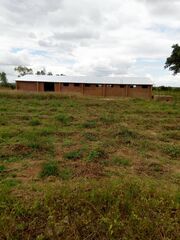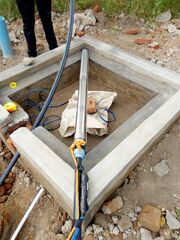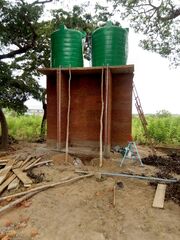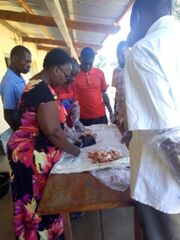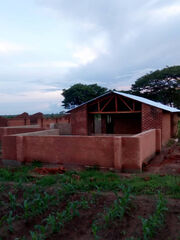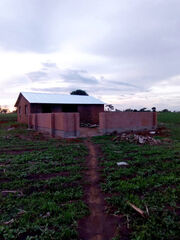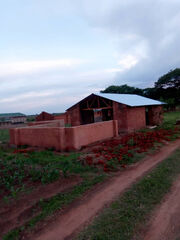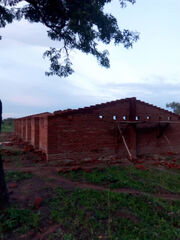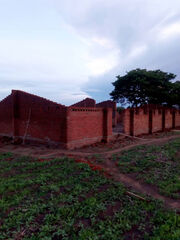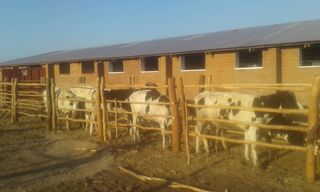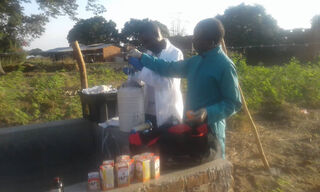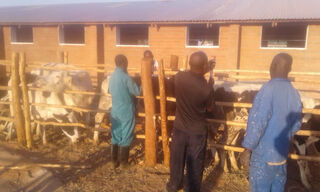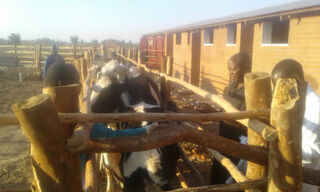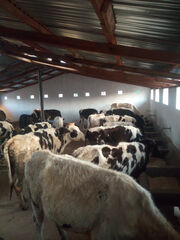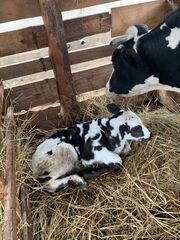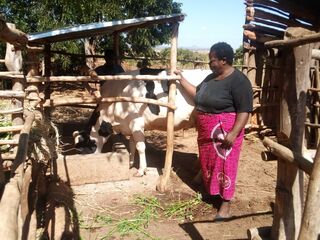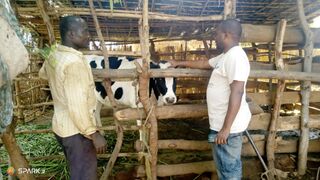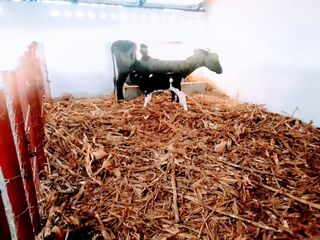Learn about Our Most Urgent Needs
Starting in 2019, we began a dairy cooperative project. The program looks to create dairy farms as a new business opportunity for Malawians that will produce milk and other dairy products at a much larger scale than a single household. In addition to dairy products, the manure from the cows are a natural replacement to chemical-based fertilizers. The leftover manure can also serve as biofuel, which produces less methane than just leaving the manure alone. We are establishing a demonstration farm as part of this project, which will be a multi-year endeavor. We hope to donate a herd of 30 cows who will be producing milk by early Spring of 2021.
As of April 2020 construction of the Ernest and Alma DeRuyter milking parlor has been completed, with the construction of the Allan, Morris, and Kitty Lisse & Leon and Adeline Kochman kraal now completed. A dairy cooperative has been formed, artificial insemination and animal husbandry training has been initiated, and a water supply provided when a well (borehole) was drilled and a solar powered submersible pump and water tanks installed.
May 21, 2020
Big news! As we speak, we are in the process of purchasing 30 dairy heifers in Southern Malawi for our dairy project. The Malawi Ministry of Agriculture is very excited about our initiative and is assisting us with the cow transport. We hope to have the heifers transported to to our farm at Kasikidzi over the weekend. Our staff will take all necessary precautions to avoid getting or bringing COVID19 to Mtunthama. In the next few months we will have finished constructing facilities for processing the milk (minus refrigeration, yogurt making, and pasteurizing , which we hope to donate in about 9 months, if we can raise enough money to do so (it’ll cost about $60,000 altogether). The milk will provide protein and income for many farm families. Click on below to see some of our new beauties!
Pictures below (finished Kraal, submersible water pump, water tanks and artificial insemination training sent April 2020)
June 9, 2020
Our dairy herd at their new home in Kadsikizi getting vaccinated against eastern valley fever.
Our herd is now, as of June 7, 2020, housed at our dairy farm in Kasdikizi. On June 19, there was an official ceremony, attended by local dignitaries including chiefs and government officials, to donate a heifer to each of 24 farmers. The remaining 6 cows will live at our demonstration dairy farm; our site for best practices. Artificial insemination has already been performed on 2 heifers and plans are underway to get the entire herd done by mid July. All first born calves will be passed on to another farm family, while subsequent calves will be kept by the donees of June 19. We hope to start milk production in 9 months and plan to initiate the next phase of the project about 8 months from now. This phase will include a milk chilling storage tank, yogurt processor, and necessary plumbing and should cost about $50,000. Donations gratefully accepted!
July 28, 2020 (Updated: November 17, 2020)
a) 15/30 cows have now been artificially inseminated and 8 are pregnant for certain. The others were done too recently to be tested. This means we will have milk production sometime in May.
b) The local Malawi agriculture government officers are so impressed with what we are doing that they asked if we could donate some Friesian bull semen “straws” ($2.50 apiece) to them. The want to start crossing Friesian genes with those of the local Malawi Zebu cattle because the Friesians produce about 15-20 Liters of milk a day while the Zebus produce only about 1-2 Liters. The Friesian milk is also much higher in fat and protein. This means that sometime in the future, between us and the government, the entire Kasungu District of 800,000 plus people could benefit from the consequent huge increase in nutrition and economic gain available to them. Pretty cool, huh?
c) The local government run veterinary school wants to start using our dairy project site as a place to send their students to learn best practices, including artificial insemination, because they have been so impressed with the work we are doing. Total expenditure ytd approximately $68,000
January 29, 2021
21 of our 29 cow dairy herd are now pregnant (we lost a cow presumably to snakebite but are awaiting the official autopsy). Our plans for the next stage of the dairy project are proceeding despite the pandemic. We have just purchased a used motorbike so that the most distant farmers in our diary cooperative can transport milk to our processing center as quickly as possible, hopefully, thereby avoiding spoilage. We will also be installing a milk refrigeration tank, milk pasteurizing system, yogurt maker, and solar power system to run all this and the rest of K2TASO headquarter needs in the next few months. We could use $5,000 US dollars to this end if you wish to help us out.
February 13, 2021
First calf born to our dairy project today. It’s a boy! Mother and calf doing well and mother is producing more milk than the farmer’s have ever seen. Calf is a product of artificial insemination; a first for the area.
July 23, 2024
The dairy cow herd continues to grow. In total, since January, 25 calves have been born. Moreover, as of July, 76 of the 306 cows in the project are pregnant, 33 of the cows are pregnant for the first time. Seven of the pregnant cows are from calves born to our beneficiaries, which shows the program is beginning to become self-sustainable.
Additionally, we are investing $1700.00 (K3 Million) on two motorcycles. These will be used to greatly increase the number of cows that can be inseminated on a daily basis.

